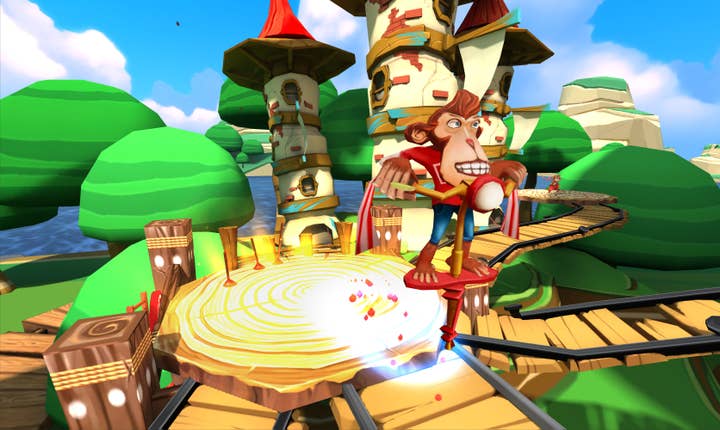Why one Chinese publisher believes PSVR will propel it in the West
Oasis Games is launching five PSVR games in the 90-day launch window; CEO Yuhui Wang says PSVR is going "to dominate the market"
Odds are if you're reading this that you haven't heard of Oasis Games, an independent Chinese games publisher responsible for bringing the indie PS4 game KOI as well as Naruto Online to the West. Oasis is currently the only Chinese company officially sanctioned to publish console games, and CEO Yuhui Wang believes that VR may be his company's chance to become a household name with Western gamers. Oasis sees a real opportunity with Sony's PSVR in particular and is planning more game launches within the 90-day launch window than any other company.
Oasis will issue digital releases of Ace Banana (day one, October 13), Pixel Gear (October 20), Weeping Doll (October 27), DYING: Reborn (January), and Mixip (date tbc), but why bank so heavily on PSVR?
"Oasis Games and our parent company Zeus Entertainment believe that there's a huge global audience, and thus opportunity, for the PlayStation VR. We are confident that it is going to dominate the market share of premium VR headsets due to its performance and competitive price," Wang says. "We've been watching the VR space as a whole, and spent a lot of time this past year looking specifically at those games and talking with developers. In doing so, it became more apparent to us that there were games that could work well for the PSVR for a broader audience compared to the other VR platforms.
"[The] timing for PSVR is great, and by far it is the most comfortable and well-packaged offering for VR fans"
"With this offering of initial games, which we're going to price aggressively to help lower the barrier of entry, we're hoping we can attract more players to the PSVR and make a strong early entry. Most publishers view early adopters as just core gamers, but we view this launch as an unique opportunity to appeal to a larger audience which we're excited about. We're in a good position as a relatively new, and smaller publisher, in that we can move fast and take more risks in areas we strongly believe in, such as the PSVR, which we believe can help our position in both the short run for market share and the long run for brand building."
Throwing five games at a new platform is a risk of course, but the investments for each title are not on the scale of big AAA productions. "They each come from passionate developers who want to have their games accessible to both early adopters and the masses looking to try out VR... We're not competing with Batman: Arkham VR," Wang adds.

VR in general is so nascent that it's hard for any publisher to count on returns from VR titles, but Oasis is "extremely confident in the VR business," and is looking at other platforms as well. That said, it believes that PSVR is primed to lead the way. SuperData recently estimated that Sony's headset would sell around 2.6 million units through this holiday, far more than either Oculus Rift or HTC Vive.
"I have a very bullish and positive outlook on VR, as we believe it's a natural evolution for our industry and technology as a whole. VR fulfils a need that both current and future consumers will appreciate, and it's up to us as game companies to help find great content to further the demand and success. Every technology has its own product life cycle, and in the case of VR it's in its early phase despite a few initial attempts from Oculus and HTC. So timing for PSVR is great, and by far it is the most comfortable and well-packaged offering for VR fans," Wang says.
Wang believes Oasis will be able to quickly differentiate itself in the VR space because most companies have been too "conservative and cautious" in their approach to VR games. "We don't see too many games and the big publishers are relying on - and benefiting from - their existing IPs. For us, our strategy is to be more invested and aggressive, as we believe it will help us gain more recognition as a global publisher as well as help to position Oasis Games as experts in the VR space over time. We have spent a lot of time thinking about what we need to do to be successful in the gaming market, and have put measures in place that allows us to be more risk-taking and quick to make moves, so we can grow quickly, and smartly, and consumers can benefit from having more games to consider," he continues.
Part of Oasis' plan to gain traction involves leveraging lower price points for its offerings. Don't expect any AAA pricing, at least not yet.
"The PSVR technology poses limitations... There are always constraints with any platform, especially in the early stages, but innovative developers always figure out a way to work around them to maintain the fun factor of a game"
"Our initial launch games are more so indie-oriented games as they come from small teams who are passionate about the new technology. And we know we've got a lot to prove ourselves as a relatively new, and unrecognized, global publisher, so we will price our games lower and competitively to allow more consumers to try our games and get familiar with who we are," Wang says. "For example, Ace Banana, our launch day game, is a perfect party game so we want to help lessen the barrier of entry by making the game $14.99, which is a great price to begin with, but we're also offering a limited time discount to further incentive PS audiences. For now, our games are digital downloads but as we grow our business in 2017, we plan to have a retail presence so are exploring the best possible options which may include bundling our games."
As noted by many in the media, including our own Dan Pearson, Sony's PS4 is relatively underpowered compared to the high-end PCs most players are using with their Rifts or Vives. Moreover, tracking and movement is limited by the ageing PS Move technology, which was not built with VR in mind. Oasis remains unconcerned by these inherent PSVR limitations, however.
"We feel the PlayStation technology and peripherals works for our needs. I also think it challenges developers to think more creatively and resourcefully, which is not a bad thing to some degree as you don't want to solely rely on tech to carry your game experience. There's always got to be give and take," Wang notes.

"The PSVR technology poses limitations on how a character could move in the game and the technology PSVR uses to track users' movement still needs to evolve. That being said, I don't think those constraints have to impact a game's playability. For example, we feel we successfully implemented the PS Move controllers for Ace Banana and Pixel Gear to replicate the experience of an arcade shooter. We also feel movement is executed well with DYING: Reborn having traditional controls with the DualShock controller and Weeping Doll using a system where players control an avatar and click to a location to transport. There are always constraints with any platform, especially in the early stages, but innovative developers always figure out a way to work around them to maintain the fun factor of a game."
Oasis isn't about to become the next Tencent overnight, but the company believes its approach to publishing in the West will allow it to slowly and steadily gain a foothold without buying massive stakes in Western companies (as Tencent has).
"I believe the perception of China is changing, and in a good way so we're viewed as a more serious competitor in the gaming space"
"First and foremost we learned what's most important is that we respect each country's own culture, processes and find great partners who believe in you and will work with you. We believe we got this far because we try to understand and respect culture as much as we can in the countries that we deploy our games. KOI and Naruto Online are two good examples of how we are trying to bring games that are universally appealing to the globe. Naruto is an extremely popular IP with a universe that fans get immersed in regardless of where they live. KOI appeals to players globally as well but in a different way; its gameplay is very simple and presents a story that is understood without the need for words," Wang states.
"We've certainly stumbled along the way and have learned from our mistakes, but we believe that makes us smarter and more adept to make decisions that will benefit our business needs. We want to build a name for ourselves, so when people think or say Oasis Games, they know that we deliver great games and will be here for the long haul. We're not going anywhere, even if our initial games don't perform as we hope, as it's about the long game that we know we can do well at since we are disciplined, quick thinking and reacting, and committed to building a loyal consumer base."
Rather than vying to outshine better known Chinese firms, Wang is grateful to Tencent, Shanda and other "breakout companies" for helping "to pave the way for the next generation of Chinese publishers like us."
Oasis, he says, is driven "to succeed and serve as a good role model for other Chinese companies and ambassador to the world."
"I believe the perception of China is changing, and in a good way so we're viewed as a more serious competitor in the gaming space. Despite being such a large country, we are a small gaming community and everyone is very supportive and positive to each other. We are similar to other Chinese companies - however big or small - in that we want to share with the world games from our country and expand our business globally," Wang concludes.









